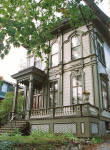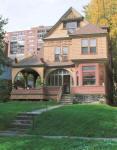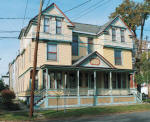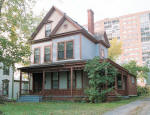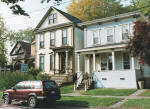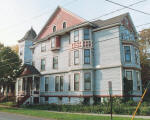Hawley-Green Historic District |
|
The Hawley-Green Historic District is one of the few 19th century
residential areas left in the city. Located in Syracuse's near northeast
side, it is one block south of James Street where beautiful mansions once
lined the street.
Originally located between the villages of Lodi and Syracuse, the area
combined industrial development, neighborhood commerce and residential
use. The area first attracted a working-class population of carpenters,
wagon makers, silversmiths, painters, and musicians. They built modest
houses along these streets in Greek Revival, Gothic Revival, and
Italianate styles.
(continued below)
With the rising prosperity of the late 19th century, together with good
trolley connections, this area became an important residential district.
In the 1870's, 1880's and 1890's, older houses set back from the road
were replaced by larger structures in the popular architectural styles
of the period -- Second Empire, Queen Anne, and the Stick Style.
Sometimes the worker's homes were simply added on to at the front and
the older, original buildings became the "additions." Mingling with
workers on these streets were now the new professional people --
doctors, lawyers, dentists -- as well as mayors of Syracuse,
Congressional representatives, and preachers.
Changes of the 20th century have had an impact on the area. In recent
decades many of the fine old homes, too large to maintain as single
family residences, have been converted to apartments or offices assuring
their survival. The Hawley-Green Street Historic District was listed on
the National Register of Historic Places in 1979 and the rehabilitation
of this unique area of Syracuse continues today.
|

